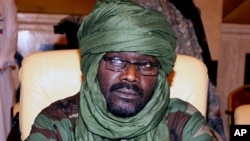The Sudanese government says it plans to close its border with Libya this week. The closure follows a demand by Sudan for Libya to expel a Darfur rebel leader.
Sudan says it will close its border with Libya beginning Thursday. A statement on the Sudanese Interior Ministry's website says it is a move to protect travelers from "bandits" and "rebels" in the rebel region.
The Libyan government responded by saying it understands Sudan's desire to tighten security in the troubled region.
But earlier this week, Sudanese officials announced Libya would expel wanted rebel leader Khalil Ibrahim, a plan that Libyan officials refused to confirm.
The International Crisis Group's Horn of Africa project director, E.J. Hogendoorn, says the border closing is a sign of growing tensions between the two nations. He says the Sudanese government may be trying to pressure Libya into kicking out Ibrahim, a leader of Darfur's strongest rebel group, the Justice and Equality Movement.
Ibrahim is in Libya after being refused haven by Chad last month. And while Khartoum continues to negotiate with other rebel groups, the Justice and Equality Movement has pulled out of the talks, saying the process is biased towards the Sudanese government.
Hogendoorn says even with the border closed, the largely unmanned crossing will remain well traveled.
"The reality though is that an official border closing is going to do very little in terms of stopping the rebels from Darfur, from moving back and forth along that border," he said.
Business people, he says, will feel the real strain as the trade route from Libya to Darfur is cut off. And ordinary people in Darfur can expect rising prices to add to their troubles.
The United Nations says despite the ongoing peace talks, violence in the region is escalating. In May, an estimated 600 people were killed in clashes between the rebels and the government.
Hogendoorn says that if Sudanese President Omar al-Bashir's plan is to pressure Libya into expelling the rebel leader, it may backfire, causing a new rift in his relationship with Libyan leader Moammar Gadhafi:
"It [the Libyan government] may respond by putting more pressure on Ibrahim, which is obviously what Bashir would like," he argued. "But the alternative is that it will irritate Gadhafi and his government, and he will try to retaliate by giving more support to the rebel forces fighting in Darfur," said Hogendoorn.
Libyan officials have not made clear how they will react to the border closing, and Ibrahim has shown no sign that he intends to return to the negotiating table.
Sudan to Close Libyan Border Over Rebel Threat





